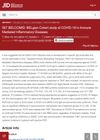9 citations,
June 2023 in “Cells” Certain natural and synthetic compounds may help treat inflammatory skin diseases by targeting a specific signaling pathway.
 16 citations,
January 2021 in “Dermatology and therapy”
16 citations,
January 2021 in “Dermatology and therapy” An imbalance in gut bacteria is linked to skin immune diseases and may affect their outcomes and related health issues.
 April 2015 in “Journal of Evolution of Medical and Dental Sciences”
April 2015 in “Journal of Evolution of Medical and Dental Sciences” People with autoimmune skin diseases often have hearing problems and should get their hearing checked early.
[object Object]  October 2021 in “Journal of Investigative Dermatology”
October 2021 in “Journal of Investigative Dermatology” COVID-19 infection rates were low in patients with immune diseases, regardless of their treatment type.
28 citations,
June 2021 in “Frontiers in immunology” A protein called lfTSLP is important in causing allergic and other skin diseases and could be a target for treatment.
15 citations,
February 2021 in “Frontiers in immunology” Leptin, a hormone from fat cells, affects immune responses and can influence skin diseases and hair growth.
 January 2022 in “International Journal of Biology Pharmacy and Allied Sciences”
January 2022 in “International Journal of Biology Pharmacy and Allied Sciences” Autoimmune diseases cause the immune system to attack the body, and management varies as some are curable and others are not.
 December 2021 in “International Journal of Biology Pharmacy and Allied Sciences”
December 2021 in “International Journal of Biology Pharmacy and Allied Sciences” Autoimmune diseases cause the immune system to attack the body, and management varies as some are curable and others are not.
 119 citations,
January 2012 in “Nutrition & Metabolism”
119 citations,
January 2012 in “Nutrition & Metabolism” Modern lifestyles, including poor diet, stress, and long-term use of certain medications, hinder the body's ability to heal from inflammation, leading to chronic diseases.
 March 2021 in “Research Square (Research Square)”
March 2021 in “Research Square (Research Square)” Patients with RASopathies have a higher risk of autoimmune disorders and should be routinely screened.
 September 2023 in “Research Square (Research Square)”
September 2023 in “Research Square (Research Square)” TNC+ fibroblasts play a key role in skin inflammation by interacting with T cells.
 82 citations,
October 2019 in “Frontiers in Immunology”
82 citations,
October 2019 in “Frontiers in Immunology” Changes to the Foxp3 protein affect how well regulatory T cells can control the immune system, which could help treat immune diseases and cancer.
1 citations,
May 2024 in “International Journal of Molecular Sciences” Adenosine receptors could be promising targets for treating inflammatory skin diseases like psoriasis.
 76 citations,
January 2017 in “World Journal of Stem Cells”
76 citations,
January 2017 in “World Journal of Stem Cells” Fat tissue cells are a promising option for healing various diseases, but more research is needed to ensure they are safe and effective.
 1 citations,
September 2023 in “Stem cell research & therapy”
1 citations,
September 2023 in “Stem cell research & therapy” Mesenchymal stem cells could help treat aging-related diseases better than current methods.
 152 citations,
December 2007 in “Gender Medicine”
152 citations,
December 2007 in “Gender Medicine” Male and female skin differ due to hormones, affecting conditions like hair loss, acne, and skin cancer, and suggesting a need for gender-specific treatments.
1 citations,
January 2016 in “Companion animal” Cats lose hair due to itching or health issues, needing various tests for diagnosis.
 January 2016 in “Journal of The Korean Medical Association”
January 2016 in “Journal of The Korean Medical Association” The document says how to diagnose and treat hair loss from alopecia areata, but there's no cure and treatments vary.
 April 2023 in “Dentistry”
April 2023 in “Dentistry” Baby teeth stem cells can potentially grow organs and treat diseases.
 127 citations,
January 2015 in “Journal of Biological Rhythms”
127 citations,
January 2015 in “Journal of Biological Rhythms” The skin's internal clock affects healing, cancer risk, aging, immunity, and hair growth, and disruptions can harm skin health.
 82 citations,
March 2016 in “Autoimmunity reviews”
82 citations,
March 2016 in “Autoimmunity reviews” Animal models have helped understand hair loss from alopecia areata and find new treatments.
 1 citations,
June 2023 in “Genes”
1 citations,
June 2023 in “Genes” Hair loss from Alopecia Areata is caused by both genes and environment, with several treatments available but challenges in cost and relapse remain.
 489 citations,
November 2021 in “Signal Transduction and Targeted Therapy”
489 citations,
November 2021 in “Signal Transduction and Targeted Therapy” The JAK/STAT pathway is important in cell processes and disease, and JAK inhibitors are promising for treating related conditions.
23 citations,
January 2016 in “Frontiers in immunology” Using low-dose IL-2 to increase regulatory T cells might be a safe way to treat type 1 diabetes without severe side effects.
 6 citations,
June 2022 in “Dermatologic Therapy”
6 citations,
June 2022 in “Dermatologic Therapy” Honokiol from Magnolia plants may be beneficial for treating various skin conditions and promoting hair growth.
 2 citations,
February 2014 in “Hair therapy & transplantation”
2 citations,
February 2014 in “Hair therapy & transplantation” Alopecia Areata is an autoimmune condition causing hair loss, influenced by genetics, environment, and possibly improved by anti-MIF therapy, with many patients experiencing regrowth within a year.
 October 2022 in “Frontiers in Cell and Developmental Biology”
October 2022 in “Frontiers in Cell and Developmental Biology” Aging skin is affected by inflammation, reduced stem cell function, and slower wound healing.
[object Object]  10 citations,
August 2020 in “Drug metabolism and drug interactions”
10 citations,
August 2020 in “Drug metabolism and drug interactions” The NUDT15 gene variant causes severe side effects from azathioprine in some Indian patients.
 125 citations,
August 2020 in “Frontiers in Immunology”
125 citations,
August 2020 in “Frontiers in Immunology” Men generally have more severe COVID-19 cases and higher death rates than women due to biological differences.
 19 citations,
January 2018 in “Scientific Reports”
19 citations,
January 2018 in “Scientific Reports” Non-immune factors play a significant role in alopecia areata.























